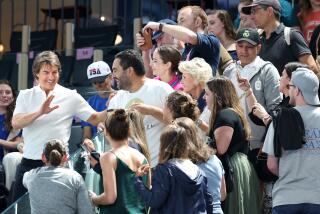Serving up a tennis surprise in Beijing
- Share via
Beijing The world of tennis, as we know it, spun off its axis a bit here Thursday night in front of thousands of enthusiastic Chinese fans.
This is the Beijing Olympics, not Wimbledon or another Grand Slam tournament. No ivy-covered walls here, no red clay or echoes of Jimmy Connors under the lights in the Big Apple.
The stadium is a big, circular chunk of concrete. It has all the charm of a freeway ramp.
Yet it may long be remembered for this night, when what was predictable and comfortable in the sport came unhinged. How will this be viewed come U.S. Open time, only 10 days away? How will this change the way the winners here Thursday night approach things in New York?
And what about the losers, Roger Federer, Venus Williams and Serena Williams? What will their state of mind be on the next big stage, one that, in the perception of tennis fans, is a much bigger deal than this?
The state of the Williams sisters has been a roller coaster for several years now. But just when you think that they are heading for the twilight of their careers, they pull off a Wimbledon double -- Venus beats Serena in the final and they win the women’s doubles -- and the lights on the marquee get brighter again.
Then, they turn around and fail to beat two beatable opponents, with slots in opposite semifinals in the Olympics at stake. Tennis furrows its brow.
Serena had lost to a good Russian player, Elena Dementieva, only once in four tries. Dementieva is ranked 11th and once got as high as No. 4. She has survived on a high level on the tour for a while despite a serve that frequently disappears, especially at key times.
So, Thursday night, on the quieter Court 1 adjacent to the Center Court mausoleum, Serena won the first set, lost the second and, unthinkably, fell behind in the third, 5-0. But she fought back to 5-3 and needed only one more break, against Dementieva’s serve, to turn it around.
So what happened? Dementieva cranked in three big first serves and won the game at love, when she jerked Serena into the net with a drop shot and then answered Serena’s short flick with a rocket that Serena volleyed wide.
Across the way, Venus was laboring against a decent player, Li Na of China, ranked 29th. She was also laboring against a hometown crowd, and Li was riding its crest.
The Chinese came to enjoy. This is their Olympics and their time. They rooted let cords. They buzzed for minutes after a linesman was hit by a serve. If a player caught a ball, or soccer-kicked it to a ball boy, they cheered like crazy. It was fun just watching their fun.
Venus Williams probably had no fun, and when her last return of serve settled into the net for a straight-sets loss, the Chinese danced in the aisles and Venus disappeared into a concrete corner.
But most inexplicable of all was the straight-sets ouster of Federer, a 12-time Grand Slam champion, the No. 1 player in the world and the face of tennis for the average fan. Federer was taken out by a very good U.S. player, James Blake, who was seeded eighth here and did what he always has done against Federer in the past: Swing away and hope they fall in.
Thursday night, they fell in enough to beat Federer, who was also beating himself with yet another lackluster effort. Since he lost to Rafael Nadal in both the French and Wimbledon finals, he has allowed something to happen that never did before: He has lost enough to allow other players to believe he can actually lose again.
Nadal has not. He advanced to the semifinals in a match ending at 1 a.m. Beijing time.
Blake said Wednesday night that, though he had never beaten Federer, he believed it was possible. Before, he would have said that and not believed it. This time, he not only believed but achieved.
“I don’t think he had his best day,” Blake said, fully aware that Federer has been having lots of those of late.
If the Federer magic isn’t gone, it certainly is on vacation somewhere.
Blake is 28, has never won a Grand Slam tournament and is aware this is his best shot.
“This could be my only Olympics,” he said. “I’ll be 32 the next time. Lots of young guys out there will be shooting at these spots in four years.”
Strangely, all that Federer and the Williams sisters had left to shoot for were doubles medals.
When play was suspended for the night, Federer was on a back court to play doubles for Switzerland, perhaps his last chance for the Olympic medal that has now eluded him three times, starting in Sydney in 2000.
The Williams sisters were also out there. Perhaps knowing that they won the doubles title once before, in Sydney, would rekindle some fire.
More likely, the three stars were merely doing what tennis fans worldwide were doing. Shaking their heads a lot.
--
Bill Dwyre can be reached at bill.dwyre@latimes.com. To read previous columns by Dwyre, go to latimes.com/dwyre.
More to Read
Go beyond the scoreboard
Get the latest on L.A.'s teams in the daily Sports Report newsletter.
You may occasionally receive promotional content from the Los Angeles Times.







